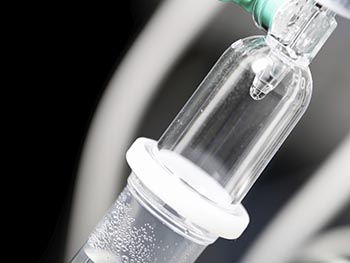Investigators at the University of Alabama at Birmingham (UAB) are studying a monthly, injectable dose of a drug used to treat bipolar I disorder in an effort to determine if a once-a-month approach will prove more effective than taking daily medication. Bipolar disorder is a lifelong, recurrent condition that often requires long-term pharmacologic treatment to prevent relapse of symptoms.
 “Patients with bipolar disorder often alternate between periods of manic or depressive episodes followed by symptom-free periods,” said Richard Shelton, M.D., professor and vice chair for research in the UAB Department of Psychiatry. “Patients can become non-compliant in taking daily medications during the symptom-free periods, which can often trigger a relapse.”
“Patients with bipolar disorder often alternate between periods of manic or depressive episodes followed by symptom-free periods,” said Richard Shelton, M.D., professor and vice chair for research in the UAB Department of Psychiatry. “Patients can become non-compliant in taking daily medications during the symptom-free periods, which can often trigger a relapse.”
Shelton and colleagues are studying a long-acting injectable formulation of aripiprazole, a partial dopamine agonist approved for use in bipolar disorder in the United States in 2002. The UAB investigators are part of the ATLAS Research Studies, conducted by Otsuka Pharmaceutical Development & Commercialization, Inc.
“We continue to search for new forms to deliver medication for bipolar I disorder to help improve treatment outcomes,” said Shelton. “If successful, this approach could provide patients with an alternative option to daily medication, with the potential benefit of improved adherence.”
Bipolar disorder, also known as manic-depressive illness, is a brain disorder that causes unusual shifts in mood, energy, activity levels and the ability to carry out day-to-day tasks, according to the National Institute of Mental Health. Symptoms of bipolar disorder can be severe. Approximately half of all bipolar disorder cases develop before age 25, with symptoms first presenting during a person’s late-teen or early-adult years.
| Contact 205-934-2484 for more information. |
Bipolar I disorder is commonly managed with medications that include mood stabilizers and antipsychotics, as well as psychotherapy. Psychotic symptoms including delusions, hallucinations and thought disorders often accompany the manic phase of bipolar disorder.
The goals of treatment in bipolar disorder include not only the effective treatment of acute mood episodes, but also the prevention of subsequent mood episodes.
Shelton is currently enrolling patients with bipolar I disorder to participate in the ATLAS studies. Contact 205-934-2484 for more information.
